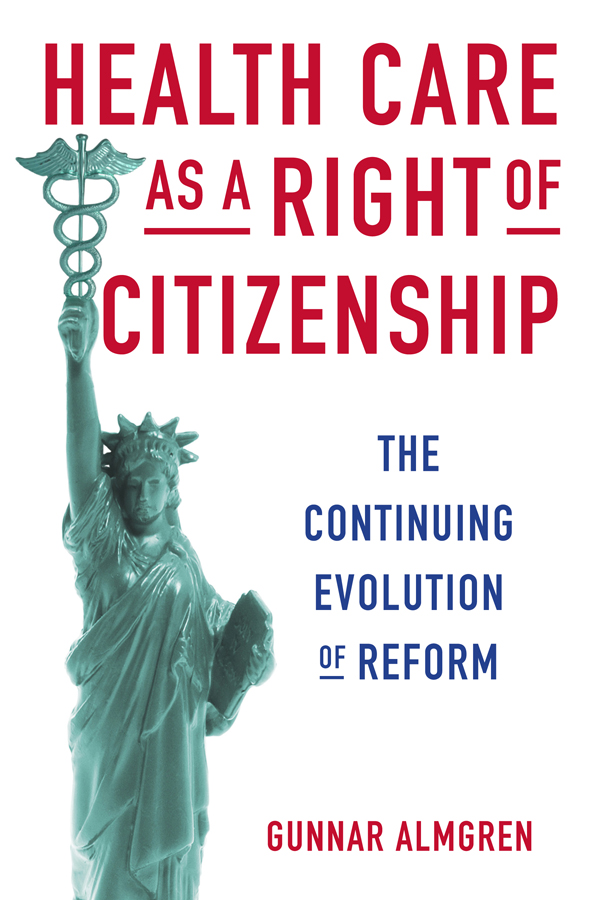Contents
Guide
Pagebreaks of the print version
HEALTH CARE AS A RIGHT OF CITIZENSHIP
Health Care as a Right of Citizenship
THE CONTINUING EVOLUTION OF REFORM
Gunnar Almgren

Columbia University Press
New York
Columbia University Press
Publishers Since 1893
New York Chichester, West Sussex
cup.columbia.edu
Copyright 2017 Columbia University Press
All rights reserved
E-ISBN 978-0-231-54331-6
Library of Congress Cataloging-in-Publication Data
Names: Almgren, Gunnar Robert, 1951 author.
Title: Health care as a right of citizenship : the continuing evolution of reform / Gunnar Almgren.
Description: New York : Columbia University Press, [2017] | Includes bibliographical references and index.
Identifiers: LCCN 2016026234| ISBN 9780231170123 (cloth : alk. paper) | ISBN 9780231170130 (paperback : alk. paper)
Subjects: | MESH: United States. Patient Protection and Affordable Care Act. | Health Care Reform | Civil Rights | Social Justice | Social Security | United States
Classification: LCC RA412.2 | NLM WA 540 AA1 | DDC 368.38/200973dc23
LC record available at https://lccn.loc.gov/2016026234
A Columbia University Press E-book.
CUP would be pleased to hear about your reading experience with this e-book at .
Cover design: Mary Ann Smith
Cover images: Statue of Liberty Homestudio/Shutterstock; Caduccus Hurst Photo/Shutterstock
Dedicated to the memory of Edgar Borgatta (19242016)
Professor emeritus of sociology, University of Washington
Immigrant, World War II veteran, eminent sociologist, teacher, and mentor to generations of social scientists
CONTENTS
As history contemplates the 2010 Affordable Care Act (ACA), there are two plausible narratives of its meaning and significance that might emerge. The first narrative, capturing the despair of its proponents in the wake of the November 2016 elections, will define the ACA as a poorly conceived and ultimately failed expansion of the welfare state akin to mainstream historys appraisal of the Johnson administrations Great Society and War on Poverty social experiments of the 1960s. The second narrative, which this book advances as by far the most likely, is that the ACAs historical significance will not be in its largely successful expansion of health-care entitlements and insurance subsidies to millions of Americans but in its affirmation by act of Congress, for the first time in the nations history, the idea that comprehensive health care must be available to all as a social right of citizenship. While previous acts of Congress sought to incrementally expand public and private health-care insurance to the aged, poor, and the disabled, the ACA is unique in its embracement of universal health insurance coverage to all citizens as an explicit policy aim.
Although the conservative Congresses that followed the 2010 passage of the ACA have since endeavored to repeal the ACA and the hard right results of the 2016 elections might seem to guarantee it, what matters is that the mainstream American public now views access to affordable health care as crucial function of just and effective governance, and any proposed alternative to the ACA must be reconciled with that expectation. However the ACA might be redefined, repackaged, or even diminished, neither the key health-care industry stakeholders (in particular the pharmaceutical, health insurance, and hospital industries) nor the American public will tolerate a return to the pre-ACA regime of a failing employment-based insurance system, 49.6 million uninsured Americans, and an epidemic of safety-net hospital closures. Political rhetoric is one thing; economic and political reality is another. While this book illuminates other reasons for the ACAs survival in fundamental and functional terms (if not in name), the penultimate argument is the absence of a coherent conservative alternative that will not propel the nation toward the next catastrophic health insurance coverage crisisa health-care financing crisis that could result in the truly radical health-care reform anathema to conservatism, namely universal social insurance for health care. It is this thought that keeps health insurance industry executives and investors awake at night, as well it should.
While this book does not share the view of many that the 2016 political resurgence of the GOP is synonymous with the demise of the ACAs core provisions to expand insurance coverage to millions of poor Americans and make comprehensive health insurance more affordable to millions more of low- and middle-income families, it also does not regard the basic approach of the ACA as anything more than a politically pragmatic and necessary step toward the evolution of a social right to health care for all Americans. In its critique, the book will illuminate the ways in which the basic policy strategy and structure of the ACA are substantially inadequate to such a task, both because of its inability to achieve universal health insurance coverage and because its substantive health-care provisions fall short of the equity and equality of opportunity requisites of political democracy. Instead, an alternative national health-care policy approach is needed, and the justification and illumination of that alternative approach are ultimately what this book is about.
I make no assumptions about the health-care policy background of the readers of this book, except that they perhaps share a keen interest in the problem of creating a health-care system that is both financially sustainable and capable of making health care accessible, adequate, and affordable to all Americans irrespective of their place in the hierarchy of advantage in American society or their individual health needs. So the book begins with two chapters devoted to a journey into the origins of American exceptionalism in health care: how we managed to create a health-care system that is the most expensive in the world, the most exclusionary among modern democracies, and among the least effective in promoting the overall health of the national population, and the emergence of the most recent era of health-care reform that has the ACA as its signature achievement. In , I then translate these principles to a set of core health-care policy aims, which in turn provide the framework for a critical appraisal of the ACAs accomplishments and deficits, ending with the books central argument that the ACA is but an evolutionary step toward what must inevitably be more radical and fundamental health-care reform.
The remainder of the book is devoted to what more radical and fundamental health-care reform should look like. In , I explore the special issues and considerations that all nations must grapple with as they seek to provide a sustainable social right to health care: the health-care needs and claims of noncitizens, the limits and boundaries of a social right to health care for all citizens, and the special entitlements to health care that might legitimately be claimed by some groups of citizens. This book is founded on the view of health-care reform as an evolutionary process, that a democratic society will inexorably move toward the collective and inclusive realization of those social rights to health care that are essential to not only the well-being of individuals but also the political voices and pathways to opportunity that define democratic citizenship. The particular approaches to evolutionary health-care reform that are advanced in the following chapters may or may not be close to what is ultimately realized, but they represent the desirable and achievable in light of the healthcare requisites of political democracy and the unique context of American exceptionalism in health care. They also represent the direction toward which the nation turned when in 2010 Congress legislated, for the first time in the history of the republic, an irrevocable acknowledgement of health care as a social right subject to claim by all Americans.








